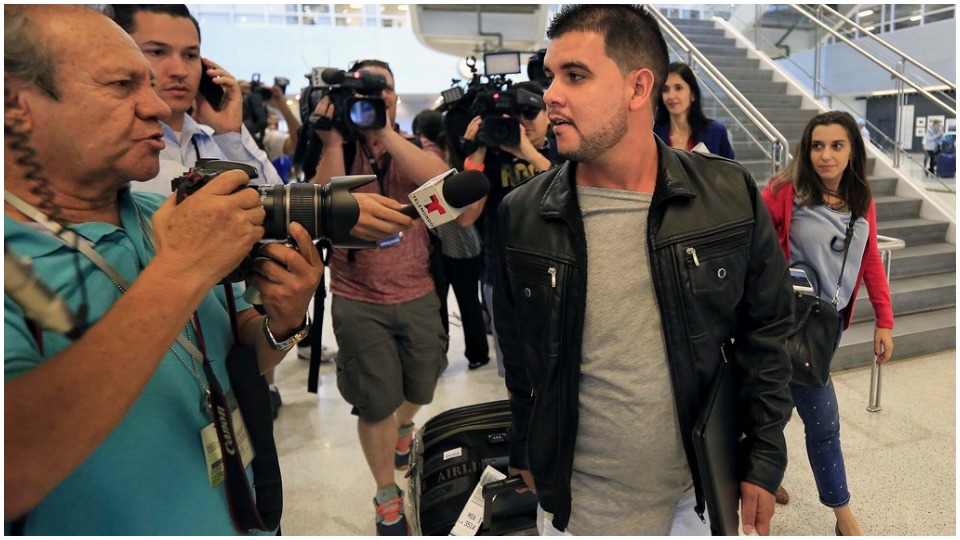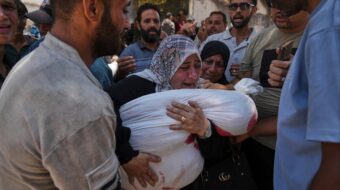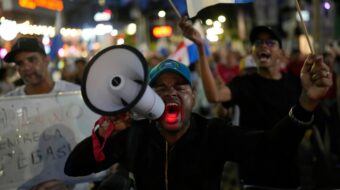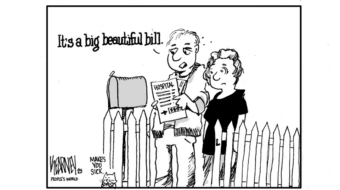
The George W. Bush administration initiated the Cuban Medical Professional Parole Program (CMPP) in 2006. The idea was to persuade Cuban doctors serving overseas to abandon their posts and relocate to the United States with the offer of resident visas. Cuba’s medical solidarity programs, in place for half a century, would suffer. President Obama ended the CMPP in January 2017. Now, some in the U.S. government want to reinstate it.
Cubans defending medical outreach associate what the doctors do with ideals of human dignity and solidarity. U.S. rationales for their own interventions are either unconvincing as to humane purposes or not for public knowledge.
The U.S. government thus speaks of bringing democracy to Cuba and Venezuela. That those nations are under U.S. siege brings to mind the Vietnamese town Ben Tre. U.S. forces destroyed it in 1968 in order “to save it.” Otherwise, what many regard as the actual purpose of U.S. interventions, the commandeering of power and wealth, is unmentionable in mainstream circles.
Cuba demonstrates coherence between intervening with health care for other peoples and values. Former Cuban President Fidel Castro, speaking in Buenos Aires in 2003, stated that, “Our country is able to send the doctors that are needed to the darkest corners of the world. Doctors, not bombs!” He had just proclaimed Cuba’s unwillingness (and inability) to launch “preventative surprise attacks in any dark corner of the world.”
Marisnely Echemendía Concepción recently sounded a strong note of human solidarity. “[F]ormed by the revolution and following the teachings of Martí, Ché, and Fidel,” the Cuban doctor carries out “health promotion and disease prevention” in Caracas.
“I believe in altruism, in humanitarianism, and in internationalism,” she states. “These make up the essence of medical education in my country and validate this teaching of the Apostle (Martí): ‘Helping someone in need is part duty and part happiness.’”
And, “I would have it known and widely so—by the peoples of Our America and throughout the world—that my humanist and solidarity-based vocation can be relied upon, always. My sole interest is to improve the health of those we care for. Political affiliation, race, and religious creed don’t matter.”
Besides, “We Cuban medical graduates take on an international commitment that remains and goes with us wherever we are needed. After all, a doctor is only a slave to his or her calling as a humanist.”
Revolutionary Cuba puts values into practice. Some 600,000 Cubans have provided medical services “in more than 160 countries.” Cuba has educated 35,613 health professionals from 138 countries at no personal cost to the students.
In assailing the Cuban doctors, U.S. officialdom has machinations, lies, and force at its disposal, but little else.
On May 7, Florida Sens. Marco Rubio and Rick Scott and Sen. Robert Menendez of New Jersey asked Secretary of State Mike Pompeo to reinstitute the CMPP. Rubio and Menendez had previously introduced a Senate resolution to that effect.
That resolution cited “human trafficking,” “forced labor,” and “salaries directly garnished by their government” as characterizing Cuban doctors’ experience in Brazil. Some 8,000 of them had joined former President Dilma Rousseff’s “More Doctors” program to care for destitute and underserved Brazilians. In late 2018, the Cuban government withdrew them due to President-elect Jair Bolsonaro’s animosity.
U.S. ally Luis Almagro, secretary general of the Organization of American States, backs restoring the CMPP. He views Cuba’s pay arrangements with other states as “modern slavery.” Cuba uses its doctors for “cementing alliances with other countries.”
Serving abroad, the doctors receive their regular salaries to which are added bonuses for overseas work and coverage for living expenses abroad. Salaries are deposited in a Cuban bank or paid to a family member. Most countries hosting the doctors reimburse Cuba’s government at rates high enough for the funds to serve other purposes.
Funds received from Brazil paid for medical equipment and modernization of Cuban medical facilities. In return for the services of Cuban doctors, Venezuela guarantees Cuba delivery of low priced oil.
Thus, U.S. meddling in Venezuela impinges upon Cuba. A recent New York Times report charged Cuban doctors in Venezuela with pressuring patients to support the government and political party of Venezuelan President Nicolás Maduro. The implication was that all the Cuban doctors did likewise.
National Security Advisor John Bolton and others in the Trump administration claim that 20,000 Cuban military personnel operate in Venezuela. The unspoken hint is that 20,000 Cuban health workers serving now in Venezuela are military people. Cuba’s Granma newspaper offers perspective: “140,000 Cuban health workers have provided…services in Venezuela”—which would have been lots of soldiers.
The Times article and the Bolton allegations are slanderous. Bolton is an old hand. As under-secretary of state for arms control in 2002, he falsely charged Cuba with having ”provided dual-use biotechnology to…rogue states.”
Cuban journalist Randy Alonso Falcon explains why the U.S. government would revive the CMPP. He cites “barefaced brain drain” and disruptive effects leading to reduced income for Cuba’s government. He could have mentioned U.S. enthusiasm for sullying the image of Cuba as the paragon of medical solidarity.
Weeks before he died in combat in 1895, emblematic Cuban revolutionary Jose Martí advised a young person in the United States: “Whoever has a lot inside doesn’t need much outside. Whoever is all display on the outside, doesn’t have much inside.”
Dr. Fernando González Isla, head of Cuba’s medical mission in Venezuela, tweeted the quotation. Dr. Marisnely Echemendía Concepción re-tweeted it. Identification with values and ethics must be Cuba’s special weapon in this conflict.










